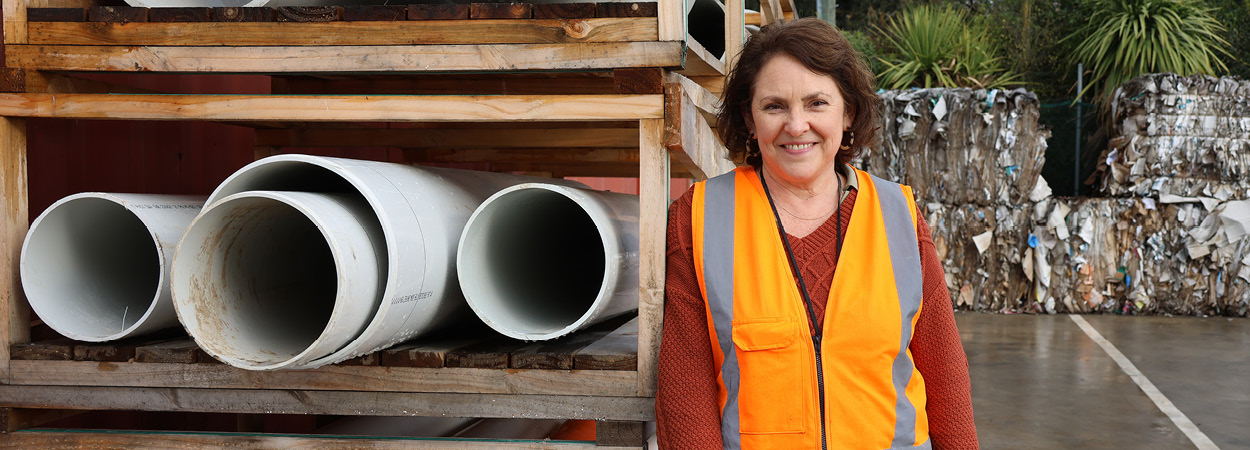A Unique Journey to Sustainability
Margot's path to becoming a building sales specialist was unconventional. With a background in tenders and experience with a construction company overseas, she didn't initially set out to specialise in this area. The Christchurch earthquakes urgently needed a construction sales specialist. A few years later when this role became vacant, Margot stepped up to meet the challenge.
"The B&C market saw real value in dealing with a sales specialist solely focused on the specific requirements involved in handling construction and demolition waste," Margot explains. "It set us apart from the competition."
"I fell into this role more than anything," Margot explains. "The Christchurch earthquakes highlighted the necessity for a specialist, and since then, we've been working hard to make a difference in how we handle construction waste."
The Recycling Process
The recycling of PVC and HDPE materials at WM New Zealand is a meticulous process. Offcuts that would typically end up in landfills are collected, cleaned, and processed at our Christchurch hub. This hub serves as the central point for the South Island, due to its proximity to the Marley manufacturing plant in Ashburton.
"We primarily get our PVC from construction sites," Margot says. "Our drivers collect the PVC, bring it to our Christchurch office, and then we wash, process, and prepare it for recycling. With its significant sustainability goals, Marley values our recycled PVC as it reduces the need for raw materials."
Challenges and Solutions
One of the challenges Margot faces is the logistics of collecting and transporting the PVC from various sites across the South Island. The cost of transportation can be high, but the value of the recycled material makes the effort worthwhile.
"We have specialised bins and recovery bags for on-site storage," Margot notes. "Our smartskips, which hold longer lengths of pipe, are especially useful for civil construction companies that generate large quantities of PVC. Our FlexiBin trucks, equipped with scales, also provide accurate weights for reporting, ensuring transparency and efficiency in the recycling process."
Expanding the Impact
WM New Zealand's recycling efforts are not limited to PVC. High-density polyethylene (HDPE) pipes, and other materials such as milk bottles, are also collected and sent to Comspec for recycling. Comspec is owned by Plastics Recycling NZ, a joint venture between WM New Zealand and Aliaxis NZ (owners of Marley). However, the recycling process is not without its complications.
"Not all plastic is created equal," Margot explains. "Marley can’t take certain recyclable plastic materials, like wheelie bins, whereas plastic spouting is fine. Additionally, we need to remove rings and tape from the pipes before recycling, a task we often take on ourselves to ensure compliance with Marley and Comspec's requirements."
Driving Sustainability in Construction
Margot's work is crucial in promoting sustainable practices within the construction industry. By providing builders and plumbers with recovery bags and flexible truck services, WM New Zealand makes it easy for them to participate in recycling initiatives.
"Every builder I propose this product to wants a recovery bag," Margot says. "It's versatile, cost-effective, and helps them do the right thing. Our system in Christchurch, with our FlexiBin trucks and manual sorting at the material recovery facility, ensures that the recycled PVC is of high quality and ready for reuse."
A Commitment to a Greener Future
The efforts of Margot Hall and the team at WM New Zealand highlight the importance of proper disposal and recycling of PVC and HDPE plastics. By managing these materials effectively, businesses can contribute to a circular economy, reduce landfill use, and promote sustainability.
"Our partnership with Marley demonstrates the value of recycled materials," Margot concludes. "We're not just reducing waste; we're creating valuable resources for new products. It's a win-win for the environment and the industry."
WM New Zealand continues to lead the way in recycling innovation, with Margot Hall at the forefront, ensuring a greener future for all.


